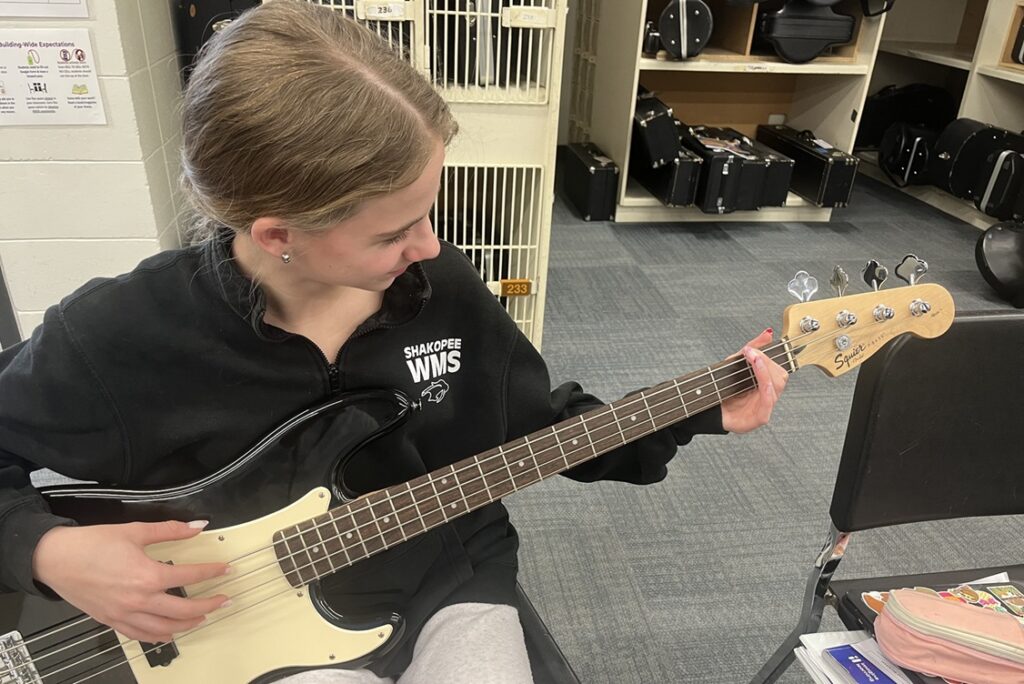Tagged Under:
Marches Aren’t Boring — They’re Just Honest
When you pull out a march, be ready to deal with the groan heard ’round the band room, but you’ll be able to discern rhythm, tuning and articulation issues immediately.
It’s Thursday afternoon. You’re running behind, the energy in the room is about as lively as a road trip through the desert, and you announce, “Let’s start with Sousa today.” Sighs ripple across the room. One trumpet puts their head down. Another mutters, “Can’t we just play something fun?” You pretend you didn’t hear it partly because you’re tired, partly because you’d rather not start the hour with a debate.
Ten measures in, reality sets in. The clarinets are waging their annual cold war with the key of E-flat. The snare is in their own time zone. The tubas look confused, and the euphoniums are playing — well, something. You stop, rewind and suddenly you’re explaining how to count eighth notes for the third time this week. You’re not even out of the first strain, and you’re wondering if anyone in the room — yourself included — actually likes marches, or if we’re all just pretending for the sake of tradition.
I’ve been there, and if you haven’t, you will. The longer I teach, the more I’m convinced that marches aren’t the enemy. They’re just the only music in your folder honest enough to show you exactly where things are at.
Every year, the same faces groan, the same measures fall apart, and somehow it always feels like you’re fighting upstream just to get a clean downbeat. I used to think it was just me or maybe just my group. Then I started listening in on other directors’ rehearsals. Turns out, it’s universal. Marches are honest in a way nobody asked for, but every band needs. Because marches teach everything.

Marches Expose Everything … and That’s Good
If you want to know how your band is really doing, hand them a march. Doesn’t matter if it’s “Washington Post,” “Entry of the Gladiators” or some old sight-reading piece that’s missing page two. You’ll find out, fast.
Marches don’t care how many trophies your band won last year, how good your principal thinks you are, or how advanced your top clarinet is. If the trio rushes, everyone hears it. If the dynamic contrast is just theoretical, the whole band sounds flat. That perfectly blended chorale from last week? Out the window the minute you hit the dogfight and nobody can stay in time.
Marches don’t lie. Every little crack in your band — rhythm, tuning, articulation — shows up. Every time. That’s why everyone complains about them. Because nothing is hidden. No lush film-score harmonies to mask that the low reeds can’t count. No pop tune drum set to distract from unbalanced brass. It’s all right there in black and white for the whole room to hear.
Uncomfortable? Sure. But also extremely useful. If you can get a march to sound good, you can pretty much play anything. That’s not just band director lore. I’ve seen it, every single year.
I used to think my group was “doing fine” until I passed out a new march and the roof caved in. I’ve watched the proudest section leaders quietly re-cross out fingerings, the percussionists suddenly “remember” their water bottles in the hallway, and the kids who crush the pop tune medley lose all confidence the second I say, “Let’s go from measure 17.” No piece of music exposes shaky counting, fake dynamics or wishful listening faster than a march. And, after the initial pain, it gives you a map of exactly what to fix.
One year, after a particularly disastrous run of “March of the Steelmen,” a saxophone — normally a model of confidence — looked at me and said, “This is humbling.” They weren’t wrong. But after the third week, when they finally held together the break strain, the whole section sat up a little straighter. Marches aren’t out to get you. They’re just brutally fair.

They’re a Free Fundamentals Clinic
Marches aren’t just music — they’re a diagnostic tool that you don’t have to pay for. Want to work on balance and blend? Play a march. Need to practice articulating together? Welcome to bar two. Counting rests? Good luck making it through the break strain if your bass drummer zones out.
When I was in high school, my director (who could tune a band with just a look) would throw a march on our stands when we thought we were sounding good. It was his way of reminding us that good tone is great, but if you can’t subdivide in a march, you can’t do it anywhere. Marches demand all the basic skills, but at a tempo and with a transparency that forces you to get real — fast.
Want your group to watch you more? Marches have more cues and sudden shifts than most kids realize. Need to talk about style? No two strains in a march are exactly alike. It’s like a fundamentals clinic, but you don’t have to bring in a guest artist.
If you spend all your rehearsal time dodging the stuff that actually improves your group, you’re not making anyone’s life easier — including your own. When my groups sound rough on a march, it’s usually because I haven’t spent enough time on the basics. And the worst part? The kids know it, too.
A clarinet player once asked me, “Are we working on marches again because we bombed the last concert?” My answer: “Yes, that’s exactly why.”
No point pretending. There’s something liberating about just saying, “We need the reps.” You don’t need to fly in a college professor to fix your band’s breathing or articulation. Sousa already did the heavy lifting — and he’s free.
On a practical note, there have been years when my budget for outside clinicians was exactly zero. Guess what? The march folder worked overtime. Sure, I missed the warm-fuzzy feeling of a pro trumpet player dazzling the kids for an hour, but the payoff was the same: Kids started listening, counting and (eventually) owning their mistakes. If you ever feel like rehearsal is just treading water, pass out a march. You’ll quickly find out what actually needs fixing.
(Side note: If you haven’t caught on by now, the solution to your problem is a march. Bad intonation? Play a march. Articulation not lining up? Play the march. Dizziness and high blood pressure? Let me prescribe a march.*)
*Not real medical advice.

Boredom Usually Means We’re Avoiding the Work
I don’t buy it when people claim marches are boring. “Boring” is usually what we call anything that makes us uncomfortable. Kids call long tones boring, too, until they realize it’s the only way to stop cracking high notes. Adults call budget meetings boring, but the truth is, we just wish they weren’t so necessary.
Marches don’t let you hide. Most of the time, nobody likes what they hear — me included. The runs aren’t clean. The trumpets can’t agree on which C is in tune. The clarinets are tired of me saying “blend, blend, blend.” But once you talk about it — really talk about why everyone dreads playing these pieces — you get somewhere honest. Nine times out of 10, the groans aren’t about the repertoire. They’re about discomfort, embarrassment or the feeling that “we’re not as good at this as we thought.”
Every year, at least one kid surprises themselves. Usually, it’s the same kid who complained the loudest back in September. By March (pun absolutely intended!), they’re bragging about how the band sounds “tight” on the Sousa. That’s progress. And it only happens when you stop dodging the honest stuff.
Look, sometimes I get bored, too. You can only run “entry, repeat, trio, dogfight, da capo” so many times before your own brain goes a little numb. But that’s when I know I’m phoning it in. When I finally own that, and decide to dig in (fix the articulations, tune the chords in the trio, add real dynamic shape), that’s when it starts to feel like progress instead of purgatory.
I had a low brass section that dreaded marches until they realized that being “heard” in a march meant every note (and every mistake) was on full display. For a couple of them, that flipped the script: Challenge accepted. I still remember the moment they got through a tricky break strain together and one kid, who’d complained for months, just looked at me, smiled and said, “Got it.” And they did.

You Don’t Have to Love Marches — But You Need Them
You don’t have to become a march superfan. You don’t even have to like them. But you need them. Your group needs them. There’s a reason why the bands that play with clarity, precision and actual excitement almost always sound good on everything else, too. It’s not magic. It’s just the result of facing what’s actually hard, over and over, until it gets easier.
Early in my career, I avoided marches when my groups sounded rough. I didn’t want to deal with the fallout — the side comments, the slouching, the second-guessing myself. But skipping the tough stuff didn’t make my group any better. In fact, it did the opposite. Now, when we’re not where we need to be, I pull out a march. Not because it’s fun (though, sometimes it actually is), but because it’s honest. It forces all of us — director included — to get out of denial and do the work.
So, next time your band groans when you hand out a march, lean in. Tell them why you’re doing it. Make the connection. And if the first run-through is ugly? Great. Now you know what needs work. That’s not failure. That’s free feedback.
Some of the best moments in rehearsal have come after a “bad” march run. I’ll ask the band, “What fell apart?” and, after the usual silence, someone will say: “We just didn’t count” or “We lost you on the cutoff” or my personal favorite, “I don’t know, but there’s definitely something wrong.”
At least it’s honest. Those are the moments when things start to get better.

March On
If you’re a few years in and still dreading marches, welcome to the club. I’m not here to make you love them, but I will tell you this: The only way through the discomfort is straight through it. Marches are honest. They’ll make you and your students uncomfortable. That’s the point. Lean into it. You’ll be surprised how much better your band sounds — not just on Sousa, but on everything.
If anyone accuses you of being “old school” because you’re drilling balance and blend on a Karl King march? Just shrug. At least you know your band can handle the truth.















